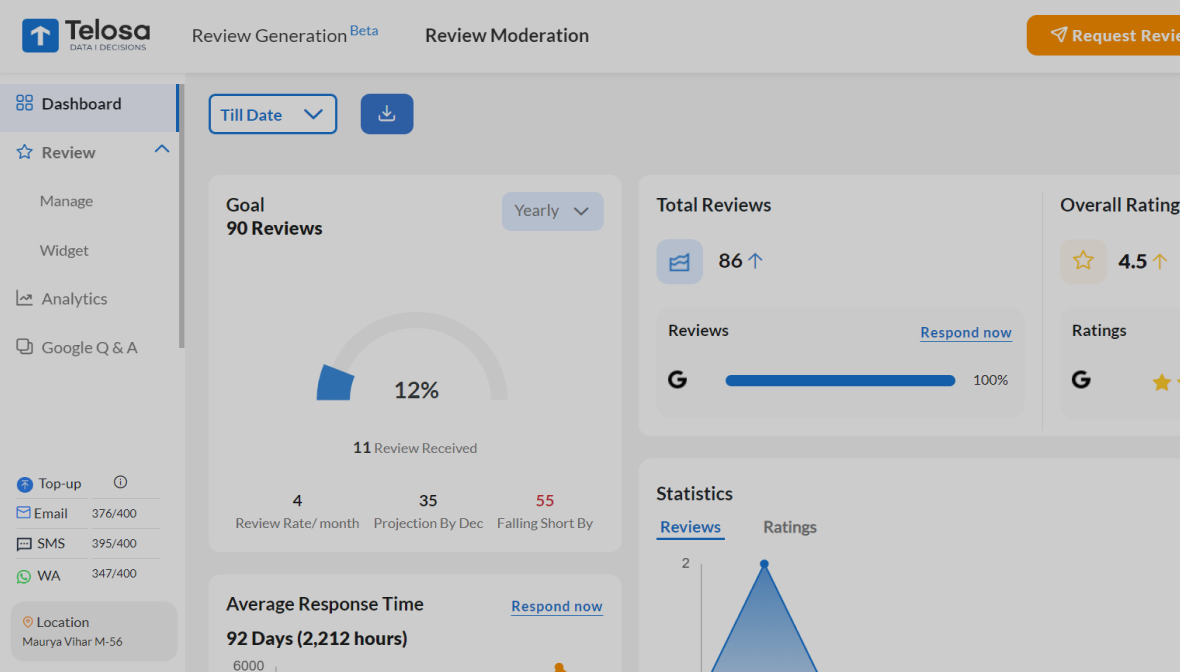Unlocking the Power of Nudge Theory: How It Influences Feedback from Customers!

Introduction: Understanding the Concept of Nudge Theory
US economist Richard Thaler, one of the founding fathers of behavioural economics, has won the Nobel Prize for Economics on Nudge Theory. Nudge theory suggests placing small, practical stimuli or “nudges” to guide us toward the decision that benefits the most in the long term.
Diving Deeper. Think of it like this: Sometimes, you just need a little push in the right direction to decide. It could be choosing between a salad and fries or signing up for a gym membership. Nudge theory is all about those little pushes. It’s about changing things to guide people toward choices that may be better for them without taking away their ability to make their own choices.
Now, how does this play out in building brand’s trust quotient? It’s human behaviour—customers who are happy with a product or service often do not leave a review; however, unhappy customers will always leave a review to express their disappointment and frustration.
Businesses often wonder how to get reviews from happy customers, as it is a favor to ask once the transaction between the two parties (business and its customers) is over. We have found that using small nudges can influence customer behaviour and encourage them to leave reviews.
“One of our clients has seen 33% increase in their review count just in first month of using Telosa Nudges – encouraging their customers to leave reviews.”
The Science Behind Nudge Theory and Its Impact on Consumer Decision-Making
The nudge theory is about gently guiding people towards better decisions without limiting their freedom to choose. It’s like giving them a little friendly push in the right direction!
The secret sauce of nudge theory is something called “choice architecture.” It’s all about how options are presented to us. By cleverly arranging our choices, we can be nudged towards making decisions that benefit us without making your customer feel that their options are limited. Pretty neat? Just think about how a simple message to leave a review/feedback can steer your customer to leave a review!
Online reviews are vital in shaping a business’s reputation and strengthening its online presence. However, many customers only leave a review when they are dissatisfied with the product or service. To encourage customers to leave positive reviews, businesses can send follow-up emails and gentle reminders, offer discounts on future purchases, request reviews after completing a transaction, or display a simple pop-up for reviews after an order is placed. If you want to implement these strategies to boost your business’s reviews, consider using Telosa Online Review Software.
Streamline your online presence. See the change Telosa can bring into your business growth.
How Businesses Can Implement Nudge Theory to Fire up Your Review Collection Strategy
So, nudge theory is about gently guiding people towards choices that are in their best interests without realizing it. It’s like giving them a friendly little nudge in the right direction!
Imagine you’re a business wanting to help your customers leave reviews for your business – you can use the nudges to create a more subtle and helpful approach –
Here’s how you can do it:
1. Make it personalised
“Tailoring your Google review request to each customer and aligning it with your brand is crucial. Start by addressing the customer by name and referencing specific details about their order, such as the product or service they received.
Incorporating personalization shows that you recognize and appreciate them, rather than treating them as faceless entities.
Additionally, ensure that your review request is instantly recognizable. With Telosa, customizing your emails to reflect your brand identity is effortless, ensuring consistency across the entire customer experience.”
2. Use social proof
We’re all influenced by what others are doing, right? So, why not showcase some favourable reviews or highlight what’s popular? When customers see that others love a particular choice, they’re likelier to drop a review for your business.
3. Subject Line / Opening Line
While sending an email /or SMS to your customers, ensure that the subject line or opening line -is compelling. Here are a few Examples.
Lights, Camera, Feedback: You’re the Star!
Help Us Shine! Leave a Review Today!
Love What We Do? Leave a Review!
Share Your Story: Leave a Review!
We’re Waiting! Your Review Needed!
Your Voice Counts: Review Reminder!
Ready, Set, Review: We’re Counting on You!
Don’t Forget Your Feedback = Our Fuel!
4. Make it easy to choose
People like feeling overwhelmed by options. Keep things simple by providing clear, easy-to-click stars or feedback links. Guide your customers through the process so they can make choices confidently.
5. Consider the timing
Sometimes, a well-timed nudge can help customers make a positive choice. Send Review Reminders at the right time of the day. A reminder shared at Dinner time or over the weekend might not be a good idea.
By using nudge theory in these friendly and subtle ways, businesses can help customers make decisions that feel right. It’s all about guiding, not pushing!
Conclusion: Leveraging Nudge Theory to Create Positive Impact on Consumer Choices and Behaviours
Nudge theory will only become more important in how businesses shape consumer behaviour. By designing choice setups that gently guide people towards better decisions, companies can create win-win situations for everyone involved.
So, let’s embrace the power of nudges and create a world where businesses and customers alike can thrive! It’s all about making good decisions for us and the world around us.









